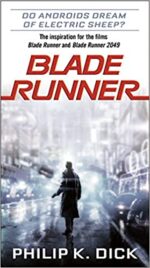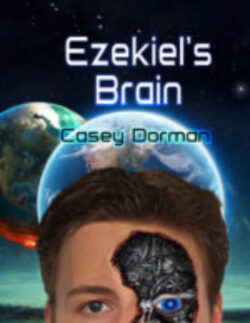Among most people’s lists of great science fiction novels, you’ll find such books as 2001 a Space Odyssey, by Arthur C. Clarke, I, Robot by Isaac Asimov, Neuromancer by William Gibson, and Do Androids Dream of Electric Sheep? (the Bladerunner film) by Philip K. Dick. These novels, have in common a focus on artificial intelligence. They also have in common that they are novels that make you think.
Of course, provoking thinking is one of the main points of science fiction. In my mind, it’s what separates science fiction from other speculative fiction genres such as fantasy and horror. The things that happen in science fiction could happen, although probably not now and probably not without some, admittedly speculative, advancements in science. Really great science fiction doesn’t just speculate about a future filled with new and sometimes strange scientific advances, it raises questions about their meaning and, in turn, about the meaning of life, our world, and the universe.
Let me give you an example.

In Do Androids Believe in Electric Sheep?, we find a future in which many humans, who can afford it, have abandoned earth following a nuclear war that threatens human genes, leaving behind those who are suspected of having some kind of defect, especially genetic ones, and those too poor to pay for leaving. The unaffected and well-to-do humans live in colonies somewhere else and are served by androids manufactured on Mars. Some of those Androids however escape and return to earth. The novel’s hero, Rick Deckard, is tasked with hunting down such rebellious androids and terminating them. Most of the people who are left on earth are poor, perhaps genetically marred in some way, and keep live animals as their most favored activity. If they are poor, as Deckard is, they keep robot replicas of live animals (Deckard has a robot sheep). A subplot involves a method of trying to engender more empathy in people by using an “empathy box” which focuses on an empathy-inducing vision of a Sisyphean character climbing a mountain and getting knocked down by falling stones. Greater empathy may reduce the chance of another devastating war. It turns out that humans and androids are so similar, that the only way to distinguish them is by testing them to see if they feel empathy, which androids supposedly do not. The film version of this novel, Bladerunner, which has Harrison Ford playing Deckard, portrays the dystopian earth in such a way, with constant rain, deteriorating buildings, food bought from street vendors, that it has become the paradigm for earth’s future in a host of films and novels.
Although the future portrayed in the novel is interesting and thought-provoking in itself, the core of the story involves the issue of the difference between fully humanized mechanical androids and real human beings. The androids develop a goal of personal survival, which puts them at odds with the human view of them as merely complicated tools. How to distinguish an android with consciousness and a personality and a will to live from a human being, which is Deckard’s job, requires testing for empathy, but the latest android models may be able to pass the test as if they are humans. When Deckard meets a woman whom he suspects is an android and she passes the test, he is not sure if passing the test really works anymore. He then has a series of encounters with androids he should be terminating, but who first fool him into thinking they are humans, even raising the question in his own mind as to whether he is a human or android. He finally decides he is human but is empathetic toward androids, whom he is supposed to kill. Complicating things, he is falling in love with one of the androids but knows he should kill her. The entire novel raises the question of what the difference between a human and an android really is.
I have been inspired by Do Androids Dream of Electric Sheep? enough to write two novels, I, Carlos, and Ezekiel’s Brain, which feature androids or humans operated by digital programs and raise the issue of what makes the difference between a human and an artificial intelligence. In I, Carlos, the human whose brain has died, is run by a computer program, and he doesn’t know he isn’t human or that his goals are all pre-programmed. His goals happen to be to assassinate the President of the United States. In Ezekiel’s Brain, the AI named Ezekiel is actually an exact copy of a human brain, complete with that human’s memories, and able to be conscious of itself, so it is, in fact, a human being in all but the material it is made from. Another group of androids, however, are not copies of human brains and are conscious, but emotionless AIs with humanoid bodies. Their goals have been programmed into them by the humans who created them and center around the command to “fulfill humanity’s highest values.” This command results in them annihilating the human race because it represents a threat to human values and almost results in the race of androids being eliminated when an aberration in their programming creates another race of AIs that are guided by the command to “acquire more resources to make more and more replicas of themselves.” Without a goal of self-preservation or emotions, the androids are unable to combat the altered race and must copy electrical circuits from the AI Ezekiel to implant emotions and the goal of self-preservation in themselves so they can fight for their own existence.
Ezekiel’s Brain is billed as a “philosophical science fiction novel” since it explores questions of the essence of humanity, morality, ethics, consciousness, and the necessity of violence for self-preservation in the context of a mystery and an adventure that begins on present-day earth and extends 200 years into the future when wars are fought in locations across the galaxy using faster than light-speed spaceships. It’s meant to please those who love to think about speculative, but not impossible, science-based ideas.
I invite all of you to purchase and read Ezekiel’s Brain, and also, I, Carlos, if you want to have your mind provoked at the same time as your imagination takes a thrilling ride.
Ezekiel’s Brain may be purchased through Amazon by clicking HERE
I, Carlos may be purchased through Amazon by clicking HERE
Want to subscribe to Casey Dorman’s fan newsletter? Click HERE.






